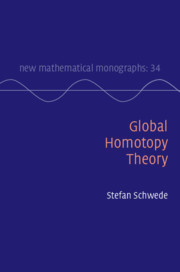Refine search
Actions for selected content:
3 results
3 - Equivariant stable homotopy theory
-
- Book:
- Global Homotopy Theory
- Published online:
- 22 August 2018
- Print publication:
- 06 September 2018, pp 227-347
-
- Chapter
- Export citation
4 - Global stable homotopy theory
-
- Book:
- Global Homotopy Theory
- Published online:
- 22 August 2018
- Print publication:
- 06 September 2018, pp 348-460
-
- Chapter
- Export citation

Global Homotopy Theory
-
- Published online:
- 22 August 2018
- Print publication:
- 06 September 2018
